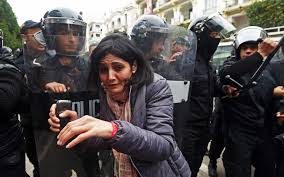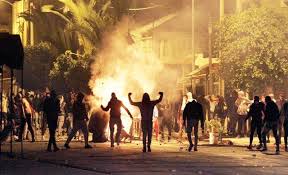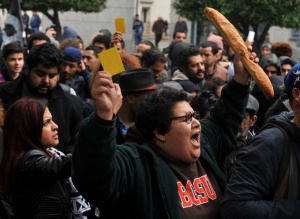
Unrest Over Austerity Measures in Tunisia
Unrest erupted across Tunisia following a government decision to implement a new finance act on January 1st, 2018. The act mainly targeted the wealthy but also triggered elevated prices for basic goods and services throughout the country. It lifted Tunisia’s value-added tax from 18% to 19%, making the consumption of taxed goods and services more expensive. Thousands gathered in public spaces across Tunisia to protest the decision. According to Al Jazeera, “Protesters torched government buildings, looted shops and blocked roads, prompting the army to deploy some 2,100 troops to different parts of the country,” (Al Jazeera). Tunisia has unquestionably made progress since initiating the Arab Spring in December 2010. It would be a shame to have it reversed due to public impatience and a harsh, miscalculated government response.

Tunisian police stand guard during a demonstration against the government and price hikes on January 9, 2018, in Tunis. AFP PHOTO /© FETHI BELAID
According to statements released by the United Nations, since the beginning of the protests, which began immediately following the decision to implement the act, more than 778 people have been arrested. A spokesperson for the Tunisian Interior Ministry stated that at least 151 people were arrested on charges of vandalism and looting, as they should have been. Tunisians should not use the unrest as an excuse to commit crimes and foster instability in the country following the significant progress it has made since protests began in 2010. At least one person was reportedly killed in the western city of Tebourba. Protests that turned violent in other cities resulted in multiple injuries. The Tunisian government should refrain from arresting people arbitrarily and should respect the Tunisian people’s right to peaceful protest, demonstrations, and assembly. Tunisian security forces should be ordered to respond to the protests with calculated caution and restraint.
Protests began peacefully in the Tunisian city of Sidi Bouzid. They quickly spread to other parts of the country, with the largest demonstrations occurring in the capital, Tunis. People chanted, waved Tunisian flags, and held banners demanding the Tunisian government abandon the act. To reiterate, notably, it was young Tunisian protesters who, in calling for reform, demanded progress and government accountability sparking the conflagration that came to be known as the Arab Spring in 2010. Tunisia is widely revered as the only country to emerge from the Arab Spring as a stable democracy. However, the country has experienced sluggish economic growth, fueling public dissatisfaction. The Tunisian President was quoted as saying, “2018 will be the last difficult year for Tunisia,” (Reuters). Tunisians have clearly demonstrated an understandably impatient yearning for progress.
In response to mass detentions, students and activists from around the country railed against the government, encircling official buildings and overflowing public squares demanding the release of protesters arrested during the past week. Rupert Colville, a spokesperson for the UN Office on Human Rights stated to press in Geneva, Switzerland, “We’re concerned about the high number of arrests, some 778 people we understand have now been arrested since Monday, and around a third of those arrested were between the ages of 15 and 20 – so very young.”

© Faouzi Dridi, AFP | Tunisian protesters take to the streets in Siliana, some 130 km south of Tunis, late on January 11, 2017
Austerity measures were adopted by the government in response to World Bank requests that the country act urgently to fix its budget deficit, which swelled to 6% of its GDP in recent months. The IMF committed itself to providing Tunisia with $2.8 billion in loans to achieve sustainable economic growth and stability. The loans were provided on the condition that the country’s governing bodies implement significant social and economic reforms. As mentioned earlier, the finance act elevated prices of basic consumer goods including bread and fuel. The increased value-added tax rate has lifted the price of cars, phone calls, internet and hotel accommodation. The IMF should provide additional recommendations to the Tunisian government and its finance ministry to help resolve the budget deficit without increasingly burdening the Tunisian people. Steps to improve the country’s deficit are crucial to establishing lasting stability.
According to Al Jazeera correspondent Hashem Ahelbarra reporting from Tunis, “People on the streets were enthusiastic about the movement’s momentum. People here say that they want to continue to take to the streets in order to put more pressure on the government to scrap the austerity measures,” (Al Jazeera). Protesters have also used the protests to express discontent with the government for failing to stand by promises to improve living standards, reduce poverty and lower high unemployment rates. The government would be wise to pursue options that will address the budget deficit without imposing too steep a cost on the middle and lower classes. This could be achieved by encouraging investment and consumption.

Tunisian protesters shout slogans outside the governorate’s offices in Tunis during a demonstration over price hikes and austerity measures on January 12, 2018. / AFP PHOTO / Sofiene HAMDAOUI
Governments around the world have responded to the protests by encouraging peace, reform, and restraint. When speaking with Tunisian officials, Turkish President Recep Tayyip Erdogan said that he is confident that if the country, “…stands united,” Tunisia could, “…overcome its problems,” (The Seattle Times).
Progress in Tunisia will come in time. Its people are determined and hopeful to achieve the rights and prosperity they were promised in 2011. Just as they brought about change then, they will so today. It is important that the government reminds people it is working for and not against them. Though plodding, the country has made a great deal of progress since the revolution in 2011. According to an article from The Economist Intelligence Unit,
“The dictatorship that repressed opposition parties, jailed political dissidents and curtailed free speech and human rights has been replaced by a pluralistic political system with over 200 registered political parties, freedom of speech and assembly, and free and fair elections, underpinned by a progressive constitution,” (EIU). Progress will continue if not hindered by unrest. The international community and its institutions must be prepared to support that progress. Tunisia is a prime example of what can be achieved when people voice their concerns about political change and the government responds through thoughtful reform. The country should continue to lead by example. If it does, the Tunisian people will see the progress for which they have yearned. At the moment, the protests are likely to continue.
Sources:
“Tunisia’s Difficult Economic Situation Will Improve in 2018 -PM.” Reuters, Thomson Reuters, 9 Jan. 2018, af.reuters.com/article/commoditiesNews/idAFL8N1P41TJ?feedType=RSS&feedName=tunisiaNews.
Jazeera, Al. “More Protests Expected in Tunisia after Mass Arrests.” News | Al Jazeera, Al Jazeera, 12 Jan. 2018, www.aljazeera.com/news/2018/01/protests-expected-tunisia-mass-arrests-180112122337505.html.
Bouazza, Bouazza Ben. “Tunisian Govt Hopes That Days of Food Protests Are Subsiding.” The Seattle Times, The Seattle Times Company, 12 Jan. 2018, www.seattletimes.com/nation-world/tunisian-government-hoping-days-of-protests-are-subsiding/.
EIU Digital Solutions. “Tunisia.” Has the Jasmine Revolution Failed?, country.eiu.com/article.aspx?articleid=1916476975&Country=Tunisia&topic=Politics&subtopic=At%2Ba%2Bglance.
